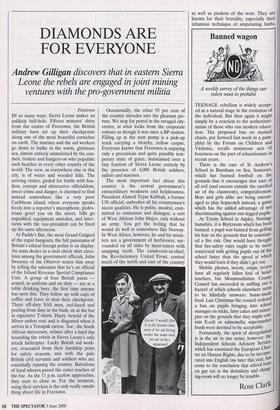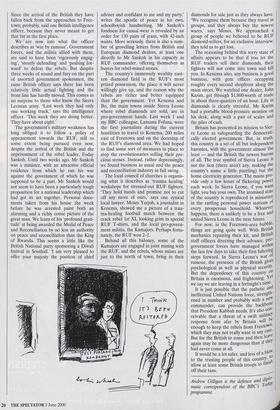DIAMONDS ARE FOR EVERYONE
Andrew Gilligan discovers that in eastern Sierra
Leone the rebels are engaged in joint mining ventures with the pro government militia
Freetown IN so many ways, Sierra Leone makes an unlikely hell-hole. Fifteen minutes' drive from the centre of Freetown, the British military have set up their checkpoints along one of the most beautiful corniches on earth. The marines and the aid workers go down to bathe in the warm, glutinous sea, almost entirely unmolested by the con- men, traders and hangers-on who populate such beaches in every other country of the world. The view, as everywhere else in this city, is of water and wooded hills. The arriving visitor, girded for battle with hus- tlers, corrupt and obstructive officialdom, street crime and danger, is charmed to find instead somewhere like a very poor Caribbean island, where everyone speaks freely into a reporter's microphone, pedes- trians greet you on the street, bills go unpadded, equipment unstolen, and inter- views with the vice-president can be fixed up the same afternoon.
At Paddy's Bar, the most Grand Guignol of the expat hangouts, the full panorama of Britain's ethical foreign policy is on display. An arms dealer in a neat check shirt circu- lates among the government officials. John Sweeney of the Observer scares him away by telling the salesman that he's an official of the Inland Revenue Special Compliance Unit. A group of four British paras armed, in uniform and on duty — are at a table drinking beer, the first time anyone has seen this. They follow up with cups of coffee and leave to man their checkpoint. Three off-duty SAS men, red-faced and peeling from days in the bush, sit at the bar in expensive T-shirts. Harry Arnold of the Mirror orders rosé and is disgusted when it arrives in a Tetrapak carton. 'Joe', the South African mercenary, relaxes after a hard day hounding the rebels in Sierra Leone's only attack helicopter. Lucky British aid work- ers, evacuated from their hardship posts for safety reasons, mix with the pale British civil servants and soldiers who are essentially running the country. Battalions of local whores. patrol the outer reaches of the bar. As the 11 p.m. curfew approaches, they start to close in. For the moment, using their services is the only really unsafe thing about life in Freetown. Occasionally, the other 95 per cent of the country intrudes into the pleasant pic- ture. We stop for petrol in the ravaged city- centre, at what looks from the corporate colours as though it was once a BP station. Filling up at the next pump is a pick-up truck carrying a blotchy, yellow corpse. Everyone knows that Freetown is enjoying only a precarious and quite possibly tem- porary state of grace, maintained over a tiny fraction of Sierra Leone entirely by the presence of 4,000 British soldiers, sailors and marines.
The most important fact about this country is the central government's extraordinary weakness and helplessness. President Ahmed Tejan Kabbah, a former UN official, embodies all his countrymen's nicest qualities. He is polite, modest, com- mitted to consensus and dialogue, a sort of West African John Major, only without an army. You get the feeling that he would do well in somewhere like Norway. In West Africa, however, he and his minis- ters are a government of herbivores, sur- rounded on all sides by meat-eaters with snapping teeth. The carnivores-in-chief, the Revolutionary United Front, control much of the north and east of the country as well as pockets of the west. They are known for their brutality, especially their infamous technique of amputating limbs. Since the arrival of the British they have fallen back from the approaches to Free- town; probably, said one British intelligence officer, because they never meant to get that far in the first place.
We f' are now into what the officer describes as 'war by rumour'. Government forces, and the militia allied with them, are said to have been 'vigorously engag- ing', 'stoutly defending' and 'pushing for- ward' to defeat the rebels. But despite three weeks of sound and fury on the part of assorted government spokesmen, the same British officer says there has been relatively little actual fighting and the front line has hardly moved. This comes as no surprise to those who know the Sierra Leonian army. 'Last week they had only one working truck,' says the intelligence officer. 'This week they are doing better. They have about eight.'
The government's military weakness has long obliged it to follow a policy of appeasement towards the RUF, still to some extent being pursued even now, despite the arrival of the British and the imprisonment of the rebel leader, Foday Sankoh. Until two weeks ago, Mr Sankoh was a minister, with an attractive official residence from which he ran his war against the government of which he was supposed to be a part. Mr Sankoh would not seem to have been a particularly tough proposition for a national leadership which had got its act together. Personal docu- ments taken from his house the week before he was arrested paint both an alarming and a richly comic picture of the great man. We learn of his 'profound grati- tude' at being awarded the Medal of Peace and Reconciliation by no less an authority on peace and reconciliation than the King of Rwanda. This seems a little like the British National party sponsoring a Diwali festival in Southall. 'I am very pleased to offer your majesty the position of chief adviser and confidant to me and my party,' writes the apostle of peace in his own, schoolboyish handwriting. Mr Sankoh's fondness for casual wear is revealed by an order for 130 pairs of jeans, with 42-inch waists. More seriously, there is also a num- ber of grovelling letters from British and European diamond dealers, at least one directly to Mr Sankoh in his capacity as RUF commander, offering themselves as buyers for rebel-mined stones.
The country's immensely wealthy east- ern diamond field is the RUF's most prized possession, the place it will never willingly give up, and the reason why the rebels are richer and better equipped than the government. Yet Kenema and Bo, the main towns inside Sierra Leone where rebel diamonds are sold, are in pro-government hands. Last week I and my BBC colleague, Lansana Fofana, were the first journalists during the current hostilities to travel to Kenema, 200 miles east of Freetown and on the doorstep of the RUF's diamond area. We had hoped to find some sort of measures in place to stop the revolutionaries selling their pre- cious stones. Instead, rather depressingly, we found business as usual and the peace and reconciliation industry in full swing.
The local council of churches is organis- ing what it describes as 'trauma healing' workshops for stressed-out RUF fighters. `They hold hands and promise not to cut off any more of ours,' says one cynical local lawyer. Moses Yarjoh, a journalist in Kenema, showed me a picture of a trau- ma-healing football match between the crack rebel 1st XI, looking grim in special RUF T-shirts, and the local pro-govern- ment militia, the Kamajors. Perhaps fortu- nately, the RUF won 2-1.
Behind all this baloney, some of the Kamajors are engaged in joint mining with the RUF, and the rebels, whose mines are just to the north of town, bring in their diamonds for sale just as they always have. `We recognise them because they travel in groups, and they always buy the newest wares,' says Moses. We approached a group of people we believed to be RUF diamond-sellers, for an exclusive interview; they told us to get lost. The reasoning behind this sorry state of affairs appears to be that if you let the RUF traders sell their diamonds, their fighters will not come into town and kill you. In Kenema also, any business is good business, with gem offices occupying roughly every second shopfront along the main street. We watched one dealer, John Karim, get through $1,000-worth of trade in about three-quarters of an hour. Life in diamonds is clearly stressful. Mr Karim had a portable blood-pressure monitor on his desk, along with a pair of scales and the piles of cash.
Britain has presented its mission to Sier- ra Leone as safeguarding the democrati- cally elected government. But, in truth, this country is a set of all but independent baronies, with the government almost the least — and the British the newest barons of all. The true symbol of Sierra Leone is not the lion (there aren't any, making the country's name a little puzzling) but the home electricity generator. The mains pro- vide only a few hours of flickering power each week. In Sierra Leone, if you want light, you buy your own. The atomised state of the country is reproduced in miniature in the rattling personal power stations of every prosperous household. Whatever happens, there is unlikely to be a free and united Sierra Leone in the near future.
For now, in the Freetown-area bubble, things are going quite well. With British mechanics repairing their kit, and British staff officers directing their advance, pro' government forces have managed within the last few days to take their first faltering steps forward. In Sierra Leone's war of rumour, the presence of the British gives psychological as well as physical securitY. But the dependency of this country 00 Britain is enormous, and frightening. Yet we say we are leaving in a fortnight's time. It is just possible that the pathetic and ineffectual United Nations force, strength- ened in number and probably with a new commander, can provide the backbone that President Kabbah needs. It's also con- ceivable that a threat of a swift thilita11 response from afar by Britain will be enough to keep the rebels from Freetown, which they may not really want in any ease' But for the British to come and then leave again may be more dangerous than if they had never come at all. It would be a lot safer, and less of a blow., to the trusting people of this country, to allow at least some British troops to finis' off their tans.
Andrew Gilligan is the defence and Tdol,Pdla°; matic correspondent of the BBC s programme.






































































 Previous page
Previous page